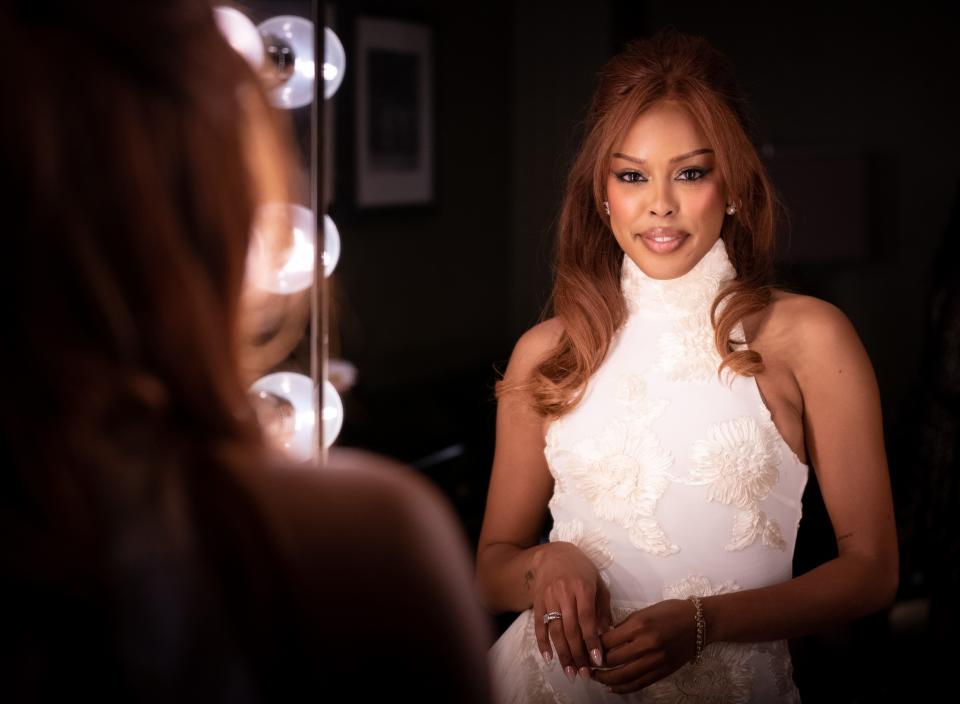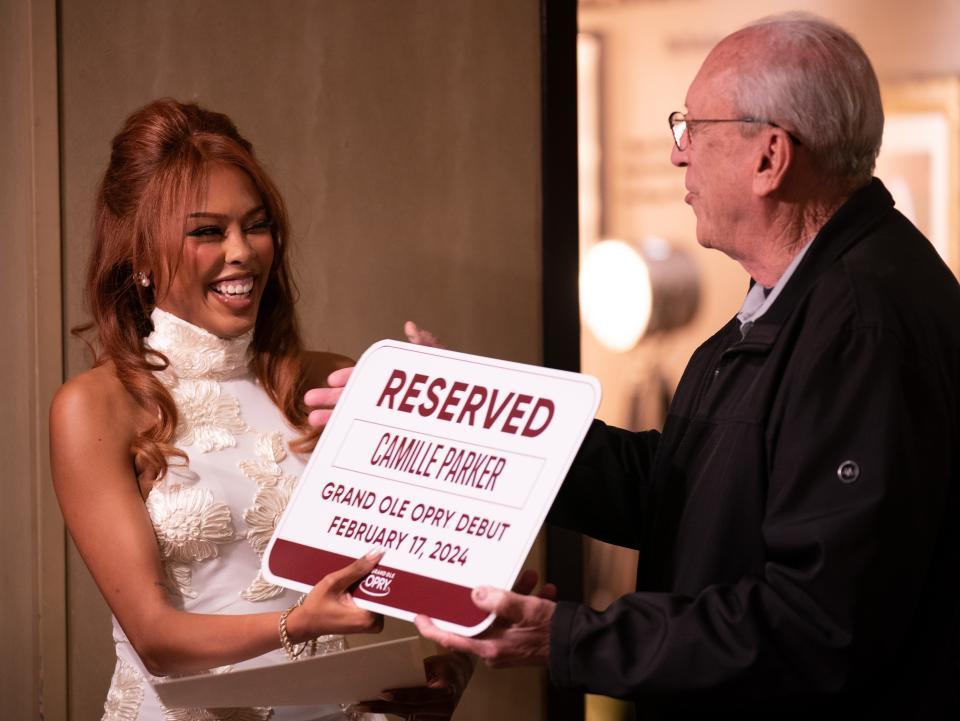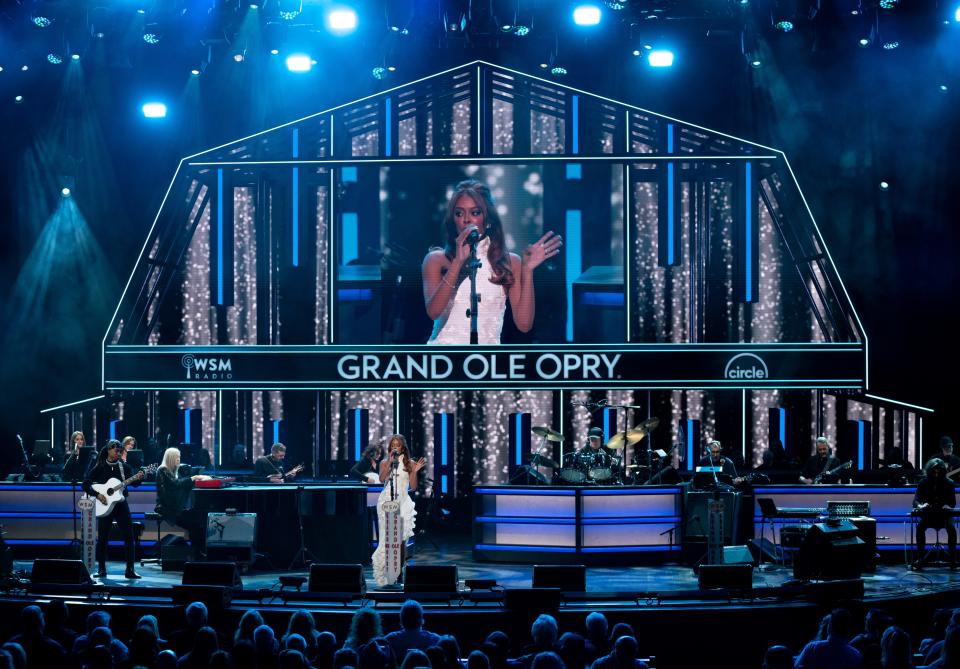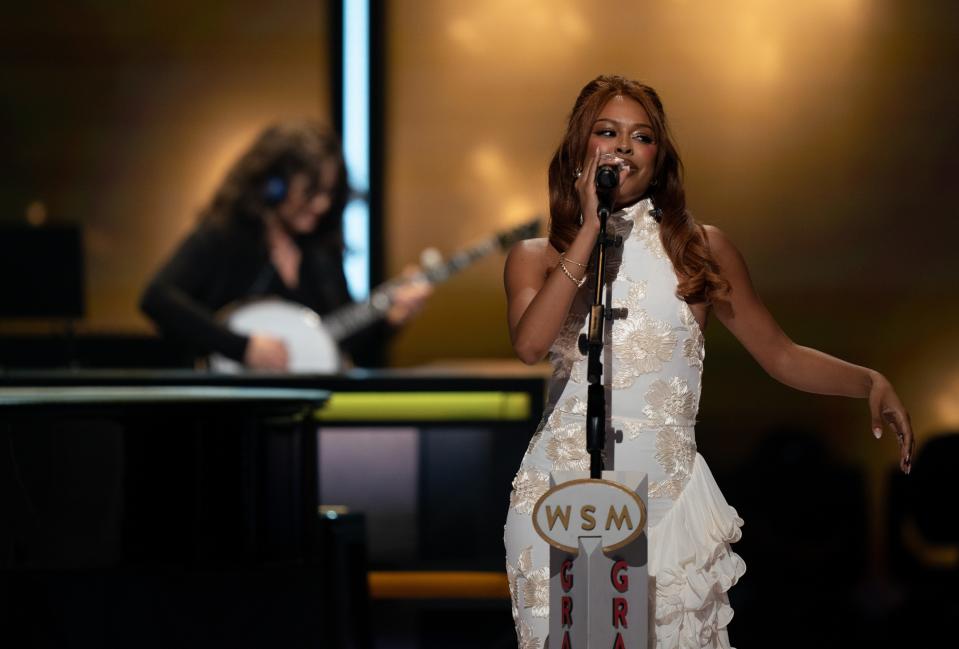Camille Parker debuts at Grand Ole Opry, highlights 'new school' Nashville evolution
Camille Parker's Feb. 17, 2024 debut at the Grand Ole Opry arrived not just as she's broken onto mainstream country radio stations as an independent Nashville artist and 10 weeks after she debuted at decade-plus-old tastemaker-beloved-honky-tonk performance series Whiskey Jam at Dierks Bentley's Lower Broadway establishment Whiskey Row.
As these events always have for Parker in the past five years (including key co-signs from Apple Music and CMT), it came forged and governed by a mantra.
"Tell the truth and make them dance."
Songs like "The Flame," "Heartless," "Peace" and the new single "Spinning Out" are pointedly earnest songs about love, loss, and self-identity that have connected well with the genre's critical and online communities.

However, in person, another mantra offers a sense to the live crowd that she's as much a movement by herself as she's even more force-filled when able to share community with them in larger quantities.
"I do no harm but take no s***. I'm the heroine of my journey."
"On the Opry stage, I shared a beautiful moment with music lovers where I told them stories and talked about my life. Similar to many of them, I have a blue-collar upbringing and am from a town where people work hard enough to make the future look better than the past," Parker continued to The Tennessean backstage at the Opry, following her debut.
"Being an artist able to advocate for my own story from an authentic, honest perspective - [gifted in country music enough] to appear on the Opry stage - is a privilege."
Parker amid country's 'Renaissance' moment
She's keenly aware that she entered the Opry's vaunted unbroken circle in the same week that Beyoncé offered that the second act of her creative "Renaissance" would be a country album.

Much like Beyoncé's art, Parker is quick to note that her work, like many others establishing themselves in country music, is inspired by Queen Bey's ability to elevate expectations of quality visual presentations while also providing safe spaces for fans to survive life's breakups and makeups, plus discover their life's next best steps.
Unlike elsewhere in the music industry, Nashville resists organic efforts to impact its industrial core with unique metaphorical roadblocks. Those barriers are often erected with a defiant immediacy that can render artists and cultures offering a grassroots challenge to Music City's long-established traditions psychologically devastated.
The plight of Black women in country's mainstream highlights this best.
Though Black women have existed in America longer than country music, only seven Black female acts have achieved placement on Billboard's charts. Moreover, five Black women have written or co-written No. 1 country songs (including recent Country Music Association Award-winner Tracy Chapman with Luke Combs' "Fast Car").
Comparatively, in the history of Billboard's Hot Country Songs sales charts, 10 white male artists have a combined two decades of chart-topping success.
Beyoncé's early impact still fundamentally shifts the playing field upon which artists like Parker play.

Though Nashville resists grassroots industry change, when top-down impacts occur in town, the seemingly all-powerful industry relents to the power of the broad-based pop cultural influence Nashville outsiders ultimately positively exert on the standards of country's mainstream.
Artists like Beyoncé and songs like "Texas Hold 'Em" and "16 Carriages" create a groundswell of power from the top to meet what has always been the country's most heartbreaking, deepest and longest crusades.
About how that moment meets with the current crop of Black female artists in Nashville - and industry, given Beyoncé's adaption to the genre's radio format taking hours instead of decades, years or weeks - desiring to engage with unprecedented influences, Parker offers, like her stage performance at the Opry, a confident, measured answer.
"I represent a new school of strong and independent country musicians inspired by learning from hard, difficult-to-digest lessons, who use a shared desire to love the art of [making and performing] music to create new footsteps in which to walk."
Parker is the latest standout of an empowered, growing, creative community
Parker was joined backstage by a veritable who's who of two decades of Black female Americana and country artists, all of whom are globally renowned and regularly touring (with names including 2023 Academy of Country Music Entertainer of the Year Chris Stapleton), plus radio-charting performers with significant streaming and viral audiences: Denitia, Madeline Edwards, Tiera Kennedy, Miko Marks, Rissi Palmer and Sacha.
In the past decade-plus, communal co-signs for aspiring Black female artists in Nashville - as a top-down concept - have arrived via programs like CMT's decade-old Next Women of Country program and three-year-old Equal Access partnership with mTheory, a global artist management and marketing company.
Parker's been both a Next Women of Country class member (like Brandy Clark, Ashley McBryde, Maren Morris, Kacey Musgraves, Carly Pearce and Lainey Wilson have been over the years) and a member of 2023's Equal Access cohort.
Also, between 2020 and 2022, the presence of Black female artists debuting on the Opry stage exponentially increased.
However, the presence of eight female Black country artists in the same building was noteworthy for the future.
Though the number grew profoundly between 2000 and 2022, Black women still accounted for only four percent of the Opry's new debuts. Black female acts also have comprised only 12 percent of CMT's Next Women of Country in the program's 11-year history.
Thus, on Saturday evening, what once occurred as Black women appearing singularly in groups of eight or 25 artists was superseded by Black women, together, at the genre's pinnacle locale, showing up together for themselves, one of their own and as well, in appreciation for country music's connective, earnest empowerment.

"Vibrant women whose music is defined by retaining dignity and authenticity in making the best song our art will define who we are as valuable contributors [to country's mainstream industry]. Embodying our honest selves in the country genre fully while also sending hard-working audiences home happy [is the ideal]," Parker says.
This article originally appeared on Nashville Tennessean: Camille Parker debuts at Grand Ole Opry, highlights 'new school' Nashville evolution
Solve the daily Crossword

